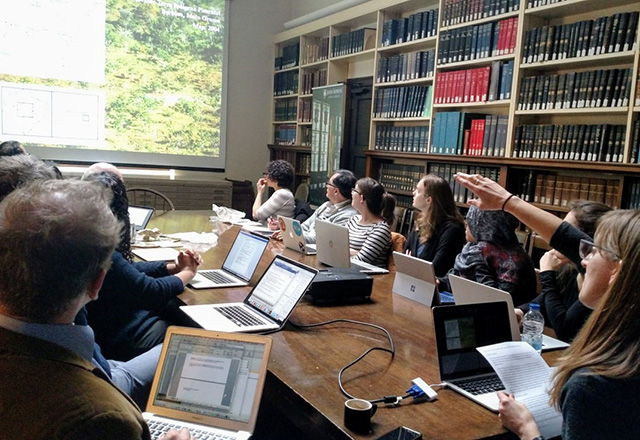Image Caption: Rosanna Dent, assistant professor of history at the New Jersey Institute of Technology, presents her work on the history of anthropology to a captivated academic audience in the history of medicine department’s seminar room. (Credit: Marian Robbins)
Every Thursday afternoon from 3-4:30, the history of medicine and history of science and technology departments hold their hallowed colloquia. These colloquia, which have existed since almost the inception of the departments, feature scholars from across the United States who present drafts of their work for feedback. As weekly seminars, colloquia provide a key learning and networking opportunity for students and faculty, not to mention the presenter. They also connect the Johns Hopkins Homewood and medical campuses, moving between both every week for thought-provoking discussions on a multitude of topics.
Generally, presenters talk about their pre-circulated draft for about 10 minutes, and then they answer individual questions for the next hour and 20 minutes. There is no limit on how many questions a person may ask, though unspoken etiquette dictates one question per person until no one else wishes to contribute. The topics vary — over the past three years, I have learned about issues ranging from mid-20th century American psychedelic trials on patients with schizophrenia, to professional astrological science in 17th-century France and masculinity’s role in the development of early 20th-century American biological sciences. Thanks to the cross-campus nature of these seminars, faculty and students are exposed to a number of subjects they may never have previously considered. Ayah Nuriddin, a history of medicine Ph.D. candidate, expressed her appreciation for the seminars: “It’s nice to be exposed to and engage with work outside of my area and have conversations about how different work intersects [with mine].” The experience gives the faculty and students a foothold in the field’s burgeoning work. With each visiting scholar, we learn more about the directions in which our fields are moving, especially where individual intellectuals converge or diverge in their ongoing research in histories of science, technology and medicine.
Thinking through new analytical frames and interpretations can also lead us into different methodologies. Second-year history of medicine Ph.D. student Sarah Zanolini especially appreciates this aspect of the colloquia. She says it applies “even when someone’s topic and/or timeframe is totally separate from my interest.” Earlier this semester, for instance, history of science professor Lijing Jiang from Colby College introduced us to the development of sustainable fish farming techniques in Maoist China and mid-20th century Taiwan. Many of us in the room did not study Chinese or East Asian history, but we still learned from Jiang’s talk. Among other things, she reminded us that agriculture can take place in water as much as on land, helping us to contemplate new ways of thinking about the environment and food history. She also demonstrated how transnational analysis — history as enacted between countries — can benefit histories of science, technology and medicine by considering how one method or technology can change across national boundaries.
While listening to conversations around such interpretations and methodologies, graduate students begin to reevaluate the methods they use and their own identities as scholars. As third-year history of science Ph.D. student Ryan Hearty noted, “You learn not only about other scholars but also about yourself.” Although my work has little to do with Chinese fish farming, I was inspired by Jiang’s talk. I work in environmental history and would never have thought to look to the history of Maoist China to find the answers I needed for my questions about water management in colonial South Africa. Yet Jiang’s analysis helped me rethink what constitutes nature: Is “nature” the untouched, natural environment, or is it more simply the ways living beings survive and intermingle in an ecosystem, even if that ecosystem is artificially created? Attending a colloquium unrelated to your topic can thus be just as interesting and useful to your research as something within your area of interest, leading you to sometimes rethink categories you thought were stable and straightforward.
Finally, the history of medicine, science and technology colloquia teach us how to be better scholars in our intellectual interactions as much as in our research. Building strong relationships with colleagues creates fertile spaces for productive work. For history of medicine Ph.D. candidate Emily Clark, colloquia teach graduate students two primary lessons. First, she says, they “give us models for presentation.” They especially teach us about the different ways scholars routinely present their work. During the seminar itself, the scholar’s presentation of his or herself can set the tone of the conversation, leading us to Emily’s second point: “[We learn] how to respond to criticism without being defensive.” Through colloquia, we are taught how to be receptive to criticism and integrate it appropriately into our work, creating a rewarding experience for both presenter and audience. Additionally, I have learned that to give an engaging presentation you need to be excited about your topic! When you are excited, the rest of the room will often share your excitement, turning what could be a dull conversation into a stimulating one. That excitement will then carry into post-colloquium discussions and continue the intellectual dialogue long after 4:30 p.m.
In these ways, the Hopkins History of Medicine, Science and Technology colloquium series grants graduate students and faculty an opportunity to get involved in and learn from the newest research in the field. The series’ variety of topics introduces the departments to new methodologies and analytical tools, while the presenters’ work compels graduate students to reflect on their own research and to understand how to be better scholars. The weekly colloquia teach us to be curious without fear of the new directions our research may take.
Related content
Want to read more from the Johns Hopkins School of Medicine? Subscribe to the Biomedical Odyssey blog and receive new posts directly in your inbox.
